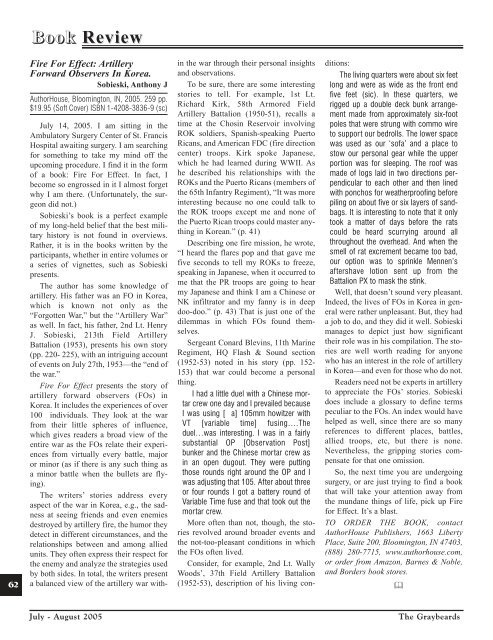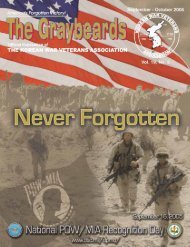National convention, october 2-5, 2005, in bossier - Korean War ...
National convention, october 2-5, 2005, in bossier - Korean War ...
National convention, october 2-5, 2005, in bossier - Korean War ...
You also want an ePaper? Increase the reach of your titles
YUMPU automatically turns print PDFs into web optimized ePapers that Google loves.
Book Review<br />
62<br />
Fire For Effect: Artillery<br />
Forward Observers In Korea.<br />
Sobieski, Anthony J<br />
AuthorHouse, Bloom<strong>in</strong>gton, IN, <strong>2005</strong>. 259 pp.<br />
$19.95 (Soft Cover) ISBN 1-4208-3836-9 (sc)<br />
July 14, <strong>2005</strong>. I am sitt<strong>in</strong>g <strong>in</strong> the<br />
Ambulatory Surgery Center of St. Francis<br />
Hospital await<strong>in</strong>g surgery. I am search<strong>in</strong>g<br />
for someth<strong>in</strong>g to take my m<strong>in</strong>d off the<br />
upcom<strong>in</strong>g procedure. I f<strong>in</strong>d it <strong>in</strong> the form<br />
of a book: Fire For Effect. In fact, I<br />
become so engrossed <strong>in</strong> it I almost forget<br />
why I am there. (Unfortunately, the surgeon<br />
did not.)<br />
Sobieski’s book is a perfect example<br />
of my long-held belief that the best military<br />
history is not found <strong>in</strong> overviews.<br />
Rather, it is <strong>in</strong> the books written by the<br />
participants, whether <strong>in</strong> entire volumes or<br />
a series of vignettes, such as Sobieski<br />
presents.<br />
The author has some knowledge of<br />
artillery. His father was an FO <strong>in</strong> Korea,<br />
which is known not only as the<br />
“Forgotten <strong>War</strong>,” but the “Artillery <strong>War</strong>”<br />
as well. In fact, his father, 2nd Lt. Henry<br />
J. Sobieski, 213th Field Artillery<br />
Battalion (1953), presents his own story<br />
(pp. 220- 225), with an <strong>in</strong>trigu<strong>in</strong>g account<br />
of events on July 27th, 1953—the “end of<br />
the war.”<br />
Fire For Effect presents the story of<br />
artillery forward observers (FOs) <strong>in</strong><br />
Korea. It <strong>in</strong>cludes the experiences of over<br />
100 <strong>in</strong>dividuals. They look at the war<br />
from their little spheres of <strong>in</strong>fluence,<br />
which gives readers a broad view of the<br />
entire war as the FOs relate their experiences<br />
from virtually every battle, major<br />
or m<strong>in</strong>or (as if there is any such th<strong>in</strong>g as<br />
a m<strong>in</strong>or battle when the bullets are fly<strong>in</strong>g).<br />
The writers’ stories address every<br />
aspect of the war <strong>in</strong> Korea, e.g., the sadness<br />
at see<strong>in</strong>g friends and even enemies<br />
destroyed by artillery fire, the humor they<br />
detect <strong>in</strong> different circumstances, and the<br />
relationships between and among allied<br />
units. They often express their respect for<br />
the enemy and analyze the strategies used<br />
by both sides. In total, the writers present<br />
a balanced view of the artillery war with<strong>in</strong><br />
the war through their personal <strong>in</strong>sights<br />
and observations.<br />
To be sure, there are some <strong>in</strong>terest<strong>in</strong>g<br />
stories to tell. For example, 1st Lt.<br />
Richard Kirk, 58th Armored Field<br />
Artillery Battalion (1950-51), recalls a<br />
time at the Chos<strong>in</strong> Reservoir <strong>in</strong>volv<strong>in</strong>g<br />
ROK soldiers, Spanish-speak<strong>in</strong>g Puerto<br />
Ricans, and American FDC (fire direction<br />
center) troops. Kirk spoke Japanese,<br />
which he had learned dur<strong>in</strong>g WWII. As<br />
he described his relationships with the<br />
ROKs and the Puerto Ricans (members of<br />
the 65th Infantry Regiment), “It was more<br />
<strong>in</strong>terest<strong>in</strong>g because no one could talk to<br />
the ROK troops except me and none of<br />
the Puerto Rican troops could master anyth<strong>in</strong>g<br />
<strong>in</strong> <strong>Korean</strong>.” (p. 41)<br />
Describ<strong>in</strong>g one fire mission, he wrote,<br />
“I heard the flares pop and that gave me<br />
five seconds to tell my ROKs to freeze,<br />
speak<strong>in</strong>g <strong>in</strong> Japanese, when it occurred to<br />
me that the PR troops are go<strong>in</strong>g to hear<br />
my Japanese and th<strong>in</strong>k I am a Ch<strong>in</strong>ese or<br />
NK <strong>in</strong>filtrator and my fanny is <strong>in</strong> deep<br />
doo-doo.” (p. 43) That is just one of the<br />
dilemmas <strong>in</strong> which FOs found themselves.<br />
Sergeant Conard Blev<strong>in</strong>s, 11th Mar<strong>in</strong>e<br />
Regiment, HQ Flash & Sound section<br />
(1952-53) noted <strong>in</strong> his story (pp. 152-<br />
153) that war could become a personal<br />
th<strong>in</strong>g.<br />
I had a little duel with a Ch<strong>in</strong>ese mortar<br />
crew one day and I prevailed because<br />
I was us<strong>in</strong>g [ a] 105mm howitzer with<br />
VT [variable time] fus<strong>in</strong>g….The<br />
duel…was <strong>in</strong>terest<strong>in</strong>g. I was <strong>in</strong> a fairly<br />
substantial OP [Observation Post]<br />
bunker and the Ch<strong>in</strong>ese mortar crew as<br />
<strong>in</strong> an open dugout. They were putt<strong>in</strong>g<br />
those rounds right around the OP and I<br />
was adjust<strong>in</strong>g that 105. After about three<br />
or four rounds I got a battery round of<br />
Variable Time fuse and that took out the<br />
mortar crew.<br />
More often than not, though, the stories<br />
revolved around broader events and<br />
the not-too-pleasant conditions <strong>in</strong> which<br />
the FOs often lived.<br />
Consider, for example, 2nd Lt. Wally<br />
Woods’, 37th Field Artillery Battalion<br />
(1952-53), description of his liv<strong>in</strong>g conditions:<br />
The liv<strong>in</strong>g quarters were about six feet<br />
long and were as wide as the front end<br />
five feet (sic). In these quarters, we<br />
rigged up a double deck bunk arrangement<br />
made from approximately six-foot<br />
poles that were strung with commo wire<br />
to support our bedrolls. The lower space<br />
was used as our ‘sofa’ and a place to<br />
stow our personal gear while the upper<br />
portion was for sleep<strong>in</strong>g. The roof was<br />
made of logs laid <strong>in</strong> two directions perpendicular<br />
to each other and then l<strong>in</strong>ed<br />
with ponchos for weatherproof<strong>in</strong>g before<br />
pil<strong>in</strong>g on about five or six layers of sandbags.<br />
It is <strong>in</strong>terest<strong>in</strong>g to note that it only<br />
took a matter of days before the rats<br />
could be heard scurry<strong>in</strong>g around all<br />
throughout the overhead. And when the<br />
smell of rat excrement became too bad,<br />
our option was to spr<strong>in</strong>kle Mennen’s<br />
aftershave lotion sent up from the<br />
Battalion PX to mask the st<strong>in</strong>k.<br />
Well, that doesn’t sound very pleasant.<br />
Indeed, the lives of FOs <strong>in</strong> Korea <strong>in</strong> general<br />
were rather unpleasant. But, they had<br />
a job to do, and they did it well. Sobieski<br />
manages to depict just how significant<br />
their role was <strong>in</strong> his compilation. The stories<br />
are well worth read<strong>in</strong>g for anyone<br />
who has an <strong>in</strong>terest <strong>in</strong> the role of artillery<br />
<strong>in</strong> Korea—and even for those who do not.<br />
Readers need not be experts <strong>in</strong> artillery<br />
to appreciate the FOs’ stories. Sobieski<br />
does <strong>in</strong>clude a glossary to def<strong>in</strong>e terms<br />
peculiar to the FOs. An <strong>in</strong>dex would have<br />
helped as well, s<strong>in</strong>ce there are so many<br />
references to different places, battles,<br />
allied troops, etc, but there is none.<br />
Nevertheless, the gripp<strong>in</strong>g stories compensate<br />
for that one omission.<br />
So, the next time you are undergo<strong>in</strong>g<br />
surgery, or are just try<strong>in</strong>g to f<strong>in</strong>d a book<br />
that will take your attention away from<br />
the mundane th<strong>in</strong>gs of life, pick up Fire<br />
for Effect. It’s a blast.<br />
TO ORDER THE BOOK, contact<br />
AuthorHouse Publishers, 1663 Liberty<br />
Place, Suite 200, Bloom<strong>in</strong>gton, IN 47403,<br />
(888) 280-7715, www.authorhouse.com,<br />
or order from Amazon, Barnes & Noble,<br />
and Borders book stores.<br />
<br />
July - August A<br />
<strong>2005</strong><br />
The Graybeards

















